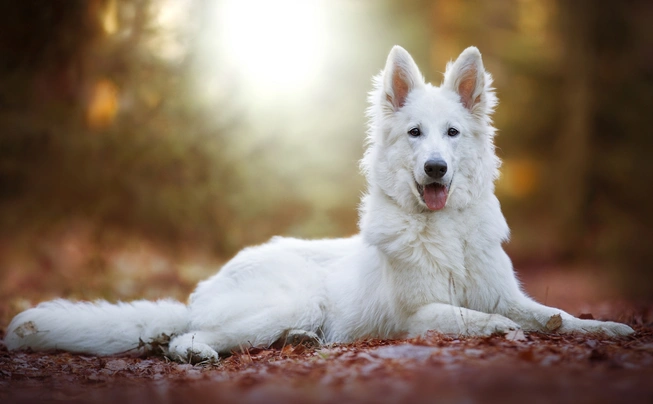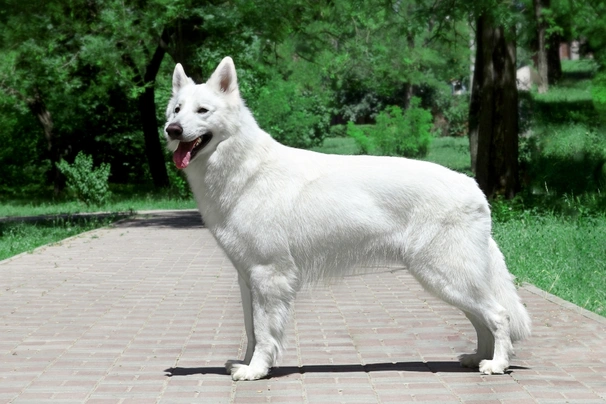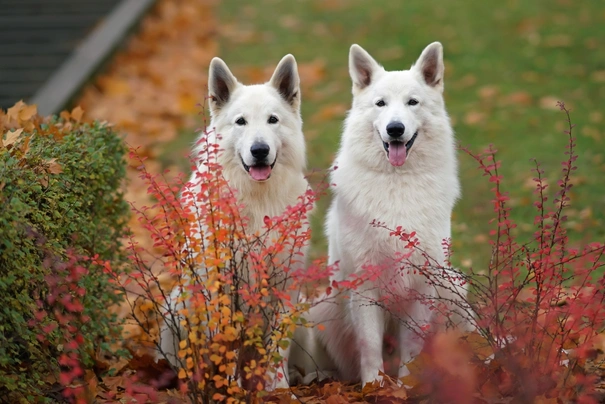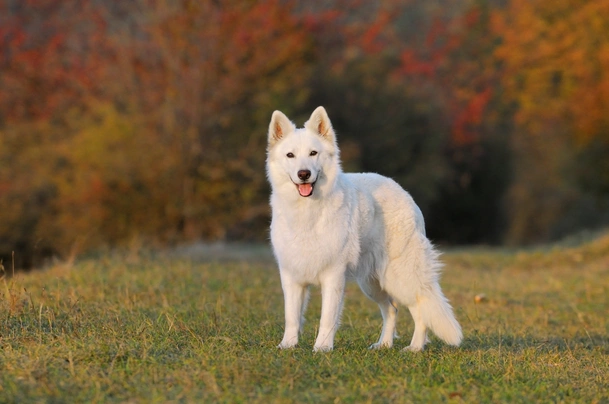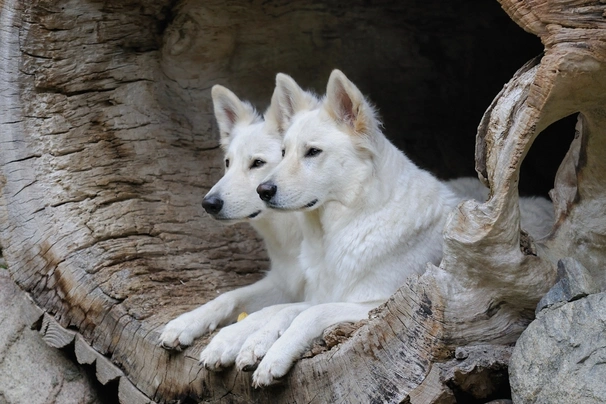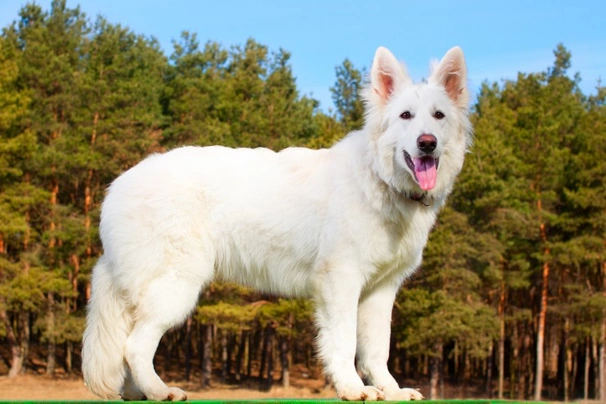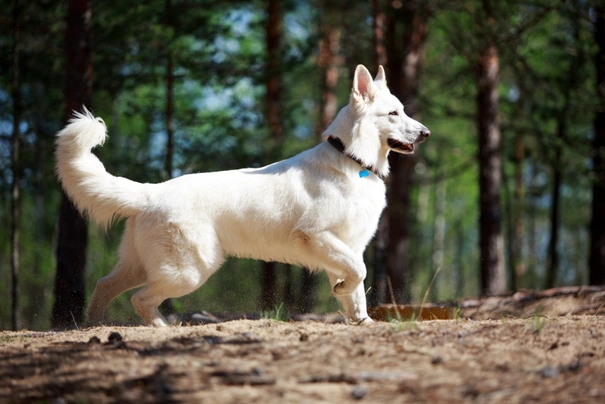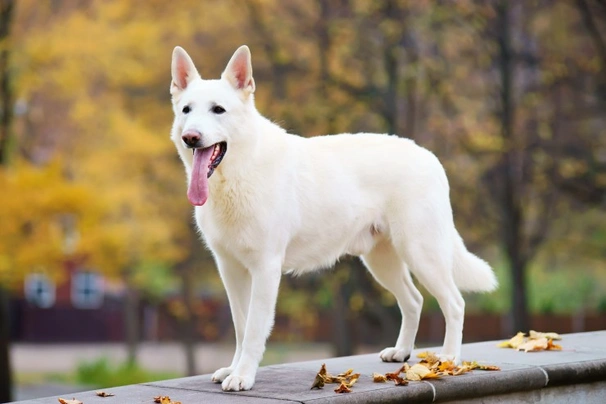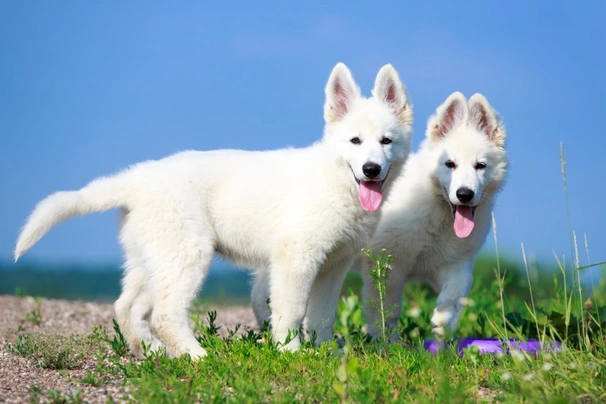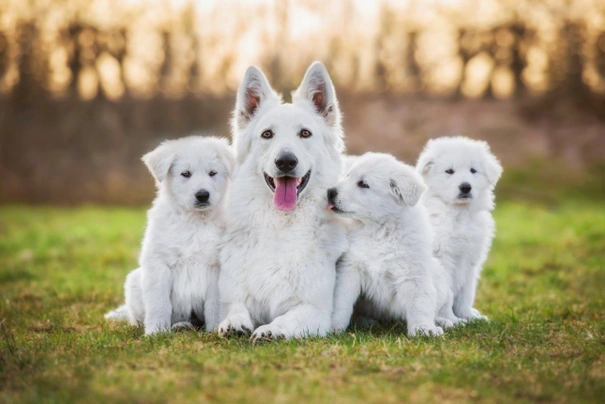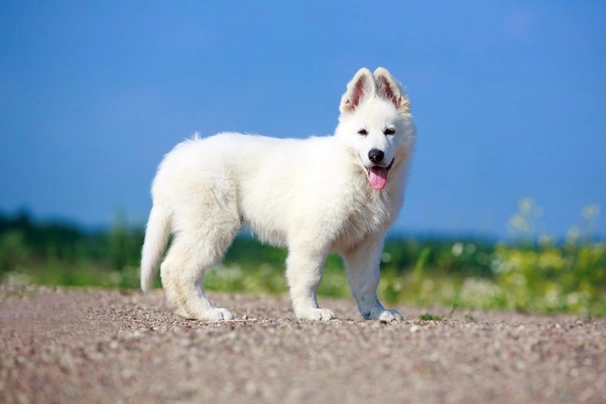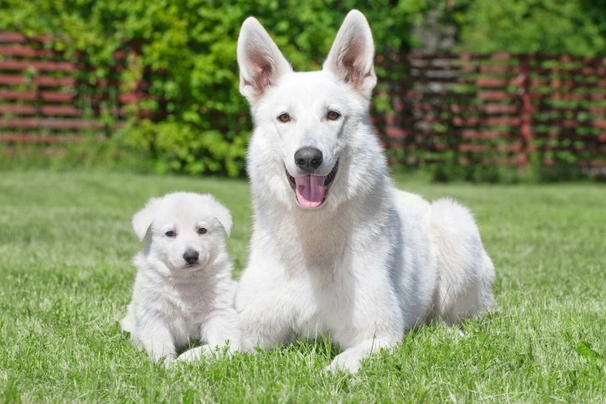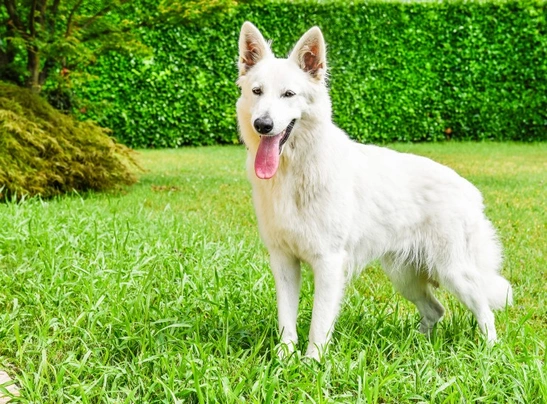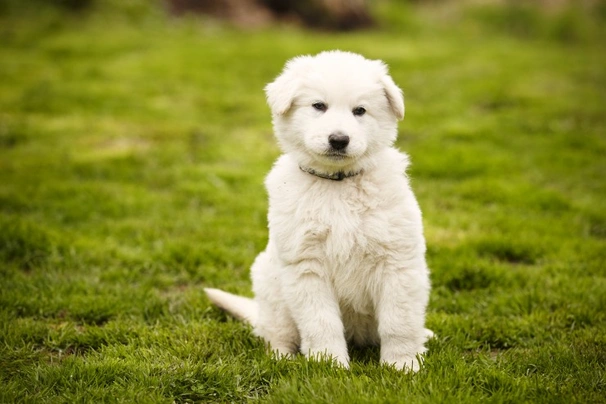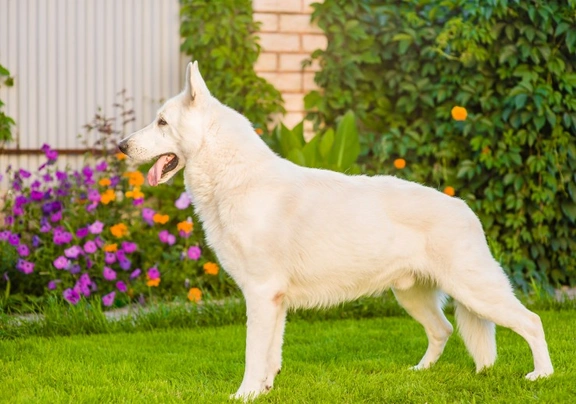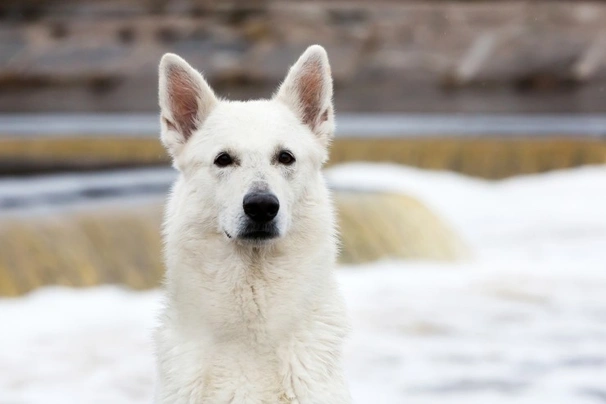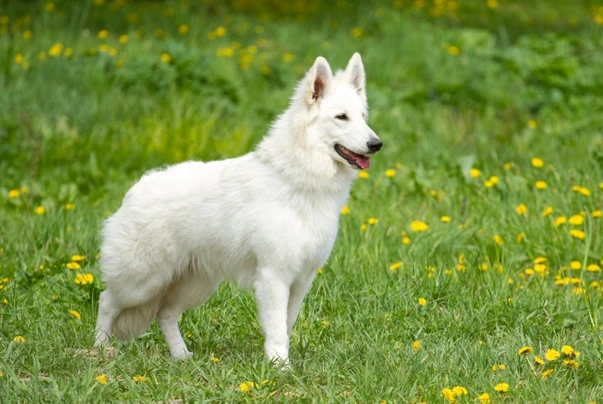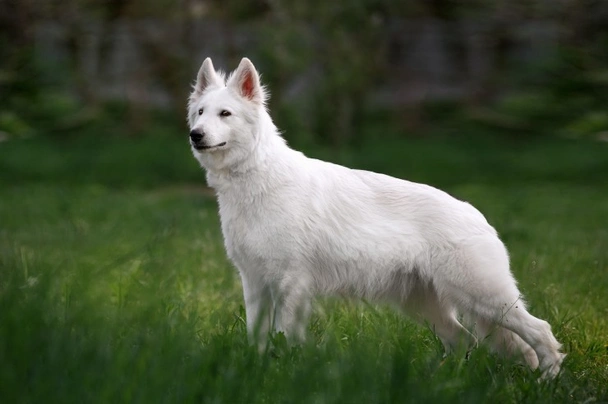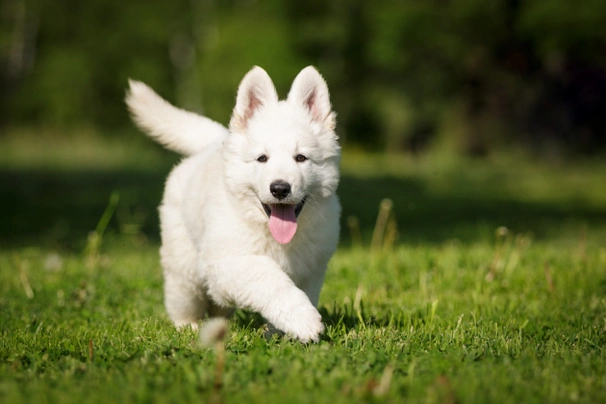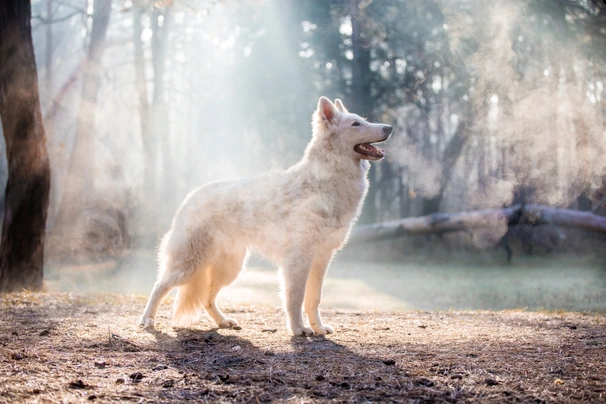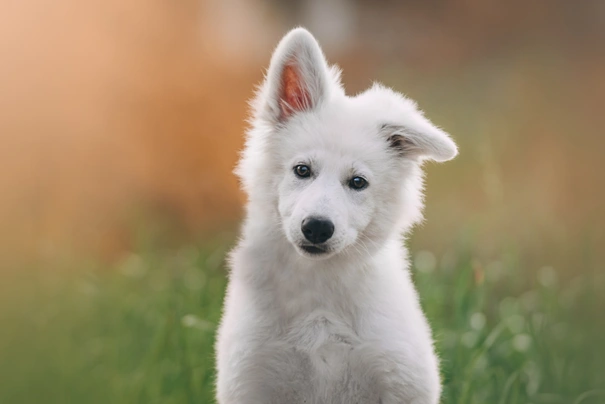White Swiss Shepherd
Pros
Cons
Introduction of the White Swiss Shepherd
The White Swiss Shepherd is a striking and elegant medium to large breed best known for its pure white double coat and its close heritage with the German Shepherd. Praised for their calm yet lively temperament, White Swiss Shepherds offer a unique blend of beauty, intelligence and devotion that appeals to active families and individuals looking for a loyal companion with working dog potential. Though emerging in the UK slowly, their captivating appearance and family-friendly nature have steadily increased their appeal in recent years.
Originally bred as a versatile shepherd and guardian dog, today they excel in roles ranging from active family pets to canine sports participants. Their physical traits combine strength and agility with an athletic and graceful stature while their temperament balances protectiveness with an even disposition, making them highly trainable and eager to please. Due to their high energy and need for mental engagement, owners should be prepared for daily exercise and consistent interactive training.
Ideal owners are those who have an active lifestyle, access to secure outdoor space, and the time to provide both physical activity and mental stimulation. White Swiss Shepherds thrive in environments where they can engage in tasks or sports and be valued members of the family pack. These dogs are particularly well-suited to households willing to dedicate time to early socialisation and ongoing training to nurture their intelligence and friendly nature.
Perfect For
Active families and individuals who enjoy outdoor activities and canine sports, owners wanting an intelligent and loyal companion, households with secure large gardens, and those with prior dog ownership experience due to moderate training demands.
Key Considerations
Requires daily moderate to high exercise and mental stimulation; needs regular grooming especially during shedding seasons; prone to separation anxiety if left alone for long periods; owners must commit to early and consistent training for optimal behaviour.
History of the White Swiss Shepherd
The White Swiss Shepherd, also known as Berger Blanc Suisse, was recognised as a distinct breed in Switzerland in 1991. Their origins trace back to white-coated lines of the German Shepherd Dog, selectively bred to preserve the clean white coat and refined temperament. These dogs were maintained separately due to the rejection of white German Shepherds in many parts of Europe. The breed's development involved foundation breeding stock imported mainly from American and Canadian White Shepherds, valued for their pure white coats and dark pigmentation.
Early Development
Breeding efforts focused on establishing a breed standard that emphasised a combination of the White Shepherd's distinctive pure white coat, strong dark pigmentation, and a balanced conformation differing slightly from the German Shepherd’s more robust lines. Notable foundation dogs include "Lobo White Burch," brought from America to Switzerland by Miss Agatha Burch, and "White Lilac of Blinkbonny," imported from the UK. These foundation stock were crossed with other imported dogs to achieve the desired breed traits across multiple generations.
Modern Recognition
The Fédération Cynologique Internationale granted full recognition to the White Swiss Shepherd in 2001, showcasing the breed in international events such as the Paris World Dog Show. Though The Kennel Club in the UK was slower to recognise the breed, they officially accepted the White Swiss Shepherd in 2017, further cementing its status. Breed clubs have since been established across Europe, including in Switzerland, Germany, and Denmark, promoting responsible breeding standards and preserving the breed's unique qualities. Despite its growing recognition, availability of well-bred puppies remains limited, leading to waiting lists among UK enthusiasts.
Appearance of the White Swiss Shepherd
Size and Build
White Swiss Shepherds are medium to large dogs with an athletic, well-muscled build that conveys power and grace. Males typically stand between 60 to 66 cm at the withers and weigh from 30 to 40 kg, while females range from 55 to 61 cm tall and weigh 25 to 35 kg. The body is longer than tall, giving a rectangular outline with a strong topline, pronounced withers and muscular loins. Their overall proportions emphasise strength without bulkiness, allowing for agility and endurance.
Coat and Colours
The breed’s hallmark is its pure white double coat, comprising a harsh or slightly wavy outer coat and a dense, soft undercoat. The coat lies close on the face, ears, and front legs but is longer and thicker on the neck, backs of the legs and tail, producing a bushy tail that tapers gracefully. Seasonal shedding is noticeable with heavier loss during spring and autumn. The nose is usually black but lighter “snow” noses are acceptable. The only Kennel Club recognised colour is white.
Distinctive Features
Heads are wedge-shaped with slightly rounded skulls and a gentle stop. Eyes are medium almond-shaped, set obliquely, brown to dark brown in colour, with conspicuous black eyelids enhancing the eyes against the white coat. Ears are high-set, standing erect with softly rounded tips, and carried forward. Their jaws exhibit a perfect scissor bite. Tail carriage is low at rest, with a slight curve, raised when alert or excited, conveying expression and poise. Movement is characterised by powerful, ground-covering strides and strong drive from the hindquarters.
Gender Differences
Males tend to be larger and more robust, with a slightly stronger bone structure, while females are slightly finer boned but no less athletic. Temperamentally, females can be somewhat more sensitive, whereas males may show more territorial instincts, although both sexes are similarly intelligent and trainable.
Temperament of the White Swiss Shepherd
The White Swiss Shepherd features a balanced temperament combining lively friendliness with natural intelligence. These dogs are confident, affectionate, and devoted to their family members, eager to be actively involved in household life. They have a gentle nature around children, often demonstrating patience and kindness, making them excellent family companions when socialised appropriately.
Bright and quick learners, White Swiss Shepherds respond well to consistent and fair training. Their alertness translates into good watchdog instincts, usually wary but non-aggressive to strangers initially, preferring to observe before interacting. Early and ongoing socialisation is essential to foster confidence and social ease with people and other animals.
While they are generally sociable with other dogs and pets if properly introduced young, their notable prey drive means care must be taken around smaller animals to prevent chasing behaviour. Their vocal tendencies manifest in expressive barking, which owners often describe as "conversational," and this can be managed with early intervention.
These dogs are happiest when given regular exercise and mental stimulation, thriving in environments where they have a clear role or purpose. Without sufficient activity or companionship, they can develop separation anxiety, leading to behavioural issues such as destructiveness or excessive barking. Therefore, they are best suited to homes where someone is present often or arrangements made for companionship.
Intelligence / Trainability of the White Swiss Shepherd
The White Swiss Shepherd is exceptionally intelligent and a quick learner, demanding early, consistent, and positive training methods to harness their considerable mental capacity effectively. Training must be engaging and varied to prevent boredom, which these dogs easily suffer from due to their high intellect. Use of positive reinforcement such as treats, praise, and play motivates these dogs best.
Puppy Training Priorities
Foundational obedience commands should be introduced early — typically within the first six months — including come, sit, stay, heel, down, quiet, leave it, and bed. Early socialisation to a diverse range of people, environments, sounds, and animals is crucial to ensure confident adult behaviour. Establishing clear household rules early prevents confusion about the social hierarchy, helping avoid dominance issues.
Training Methods That Work
Short, frequent training sessions (15-30 minutes) that keep engagement high are recommended. Owners should avoid repetitive drills that might frustrate or bore the dog, instead incorporating fun and mentally stimulating activities such as puzzle toys or scent work. Clear communication using calm, firm tones and consistent body language reinforces understanding.
Advanced Training Potential
White Swiss Shepherds can excel in various dog sports including agility, flyball, and obedience competitions due to their physical stamina and eagerness to work. Their strong working instincts also make them excellent candidates for search and rescue training or herding activities. With ongoing training and enrichment, they continue to develop mentally and physically throughout their lives.
Common Training Mistakes
Pitfalls include inconsistent enforcement of rules, excessive punishment, and under-stimulation of their intellectual needs, which can lead to behavioural problems. Over-exercising puppies risks joint damage, so early physical activity should be carefully managed. Training owners should maintain patience and consistency for optimal results.
Children and other
White Swiss Shepherds are generally gentle and patient with children, making them excellent family dogs when interaction is properly supervised given the breed’s size and strength. Toddlers require close adult supervision during play to prevent unintentional knocks or injuries due to the dog’s exuberance and energy.
Age-Specific Interactions
With young children, the breed’s calm disposition often facilitates nurturing bonds, while teenagers appreciate their trainability and playful nature. However, all children should be taught proper handling, including gentle petting and respecting the dog’s space to avoid accidental stress or defensive behaviour.
Teaching Children Proper Interaction
Adults should instruct children to avoid rough play, sudden movements, or pulling on ears and tails. Establishing clear boundaries for when the dog can have quiet time or retreat to a safe space helps prevent overwhelmed reactions. Positive reinforcement when children behave calmly around the dog fosters harmonious relationships.
Breed-Specific Considerations
Owners must be mindful of the dog’s size and energy levels, providing adequate exercise to channel their enthusiasm and prevent boisterous behaviour that could be challenging for smaller children. The breed’s prey drive means care is needed if other small pets are in the household.
Creating Safe Environments
Ensure play areas are secure and supervised. Puppy-proof gates or playpens help restrict access to spaces unsuitable for young children and dogs interacting unsupervised. Teaching respect and safe handling protects all parties.
Health of the White Swiss Shepherd
The White Swiss Shepherd has an average lifespan of 12 to 14 years when cared for properly with a balanced diet and regular health checks. Like many large breeds, they are prone to some hereditary conditions, but careful health screening and responsible breeding significantly reduce these risks.
Breed-Specific Health Conditions
Notable health concerns include hip dysplasia and elbow dysplasia, both genetic joint issues that can affect mobility. Skin allergies and other dermatologic conditions also occur occasionally, requiring prompt veterinary care. Degenerative joint disease and bloat are further considerations for this breed.
Genetic Testing Requirements
Responsible breeders perform hip and elbow scoring with BVA-registered vets to minimise dysplasia risks. Genetic screening for conditions such as Von Willebrand’s Disease and other inherited disorders is becoming more common, helping ensure only healthy dogs enter breeding programs.
Preventive Healthcare Schedule
Puppies start vaccinations between 10 to 12 weeks, with full protection achieved after the second dose and regular boosters later in life. Annual health checks and parasite control are essential for long-term wellbeing. Veterinary advice should be followed closely for spaying and neutering timing, often recommended between 6 to 12 months of age for this breed.
Insurance Considerations
Due to potential health risks and average breed lifespan, comprehensive insurance is advisable. Claims often include joint surgeries or allergy treatments, so policies should offer appropriate coverage. Early health testing can reduce insurance premiums by evidencing responsible care.
Caring for the White Swiss Shepherd
White Swiss Shepherds require attentive daily care to maintain their health and happiness. Their thick double coat calls for regular grooming to prevent matting and manage shedding, especially during seasonal changes. Clean ears regularly to avoid infections, and maintain dental hygiene with brushing to support overall health.
Daily Care Routine
Start the day with a brisk walk or play session, followed by feeding a balanced meal. Provide mental enrichment with training or puzzle toys mid-day. Evening activity should consist of another walk or off-lead play in a secure area. Throughout the day, monitor for signs of stress or discomfort.
Living Environment Needs
These dogs thrive in homes with large, securely fenced gardens where they can roam safely. Urban apartments are generally unsuitable unless owners commit to extensive outdoor exercise and mental stimulation daily. They are sensitive to extreme weather; shade and water are needed during hot summers while shelter is essential in cold, harsh winters.
Seasonal Care Adjustments
During warm months, limit exercise during peak heat, provide fresh water and shade, and monitor for overheating. In winter, reduce exposure time, dry thoroughly after wet weather, and consider dog clothing if the climate is particularly cold. Shedding peaks require more frequent brushing and coat maintenance.
Senior Care Adaptations
For older dogs, adjust diet for lower calories but higher digestibility, monitor weight to avoid obesity or cachexia, provide softer bedding for arthritic joints, and modify exercise routines to gentler, shorter activities. Regular vet check-ups increase in frequency to detect and manage age-related issues promptly.
Grooming of the White Swiss Shepherd
The White Swiss Shepherd’s thick double coat requires consistent grooming to maintain coat health and manage heavy shedding typical of the breed. Brushing several times a week helps remove loose hair and prevents mats, especially during the bi-annual heavy shed periods in spring and autumn.
Coat Maintenance Schedule
Daily brushing is ideal during shedding seasons, focusing on areas where the coat is longer such as the neck, tail, and backs of the legs. Outside heavy shed periods, brushing 2-3 times per week suffices to keep the coat clean and healthy.
Professional Grooming Requirements
Professional grooming every 6-8 weeks can assist with deep coat maintenance, nail trimming, ear care, and bathing using dog-specific shampoos. This helps keep the coat soft and dense while checking for skin issues or infections.
Home Grooming Techniques
Effective home grooming requires firm slicker brushes, undercoat rakes, and grooming gloves to reach the dense undercoat without damaging the top coat. Ears should be checked and cleaned regularly with vet-approved solutions to prevent wax build-up and infections. Nail trimming and toothbrushing should be part of weekly care rituals.
Common Grooming Challenges
Mats may form if brushing is neglected, especially behind the ears and underneath the tail. Skin allergies may cause itchiness and secondary infections, necessitating vet care and specialized shampoos. Preparing for seasonal shedding spikes helps minimise hair accumulating in the home.
Exercise of the White Swiss Shepherd
White Swiss Shepherds are energetic working dogs that require substantial daily exercise and mental engagement to remain happy and healthy. A minimum of one hour of vigorous physical activity daily is essential, ideally complementing this with off-leash running in a safely enclosed garden or park.
Daily Exercise Requirements
Two main walks per day — a shorter one in the morning and a longer, varied route in the afternoon — suit their stamina and mental needs. Off-lead playtime and interactive games like fetch help release excess energy. Puppies require limited exercise to protect developing joints, avoiding stair climbing and jumping.
Suitable Activities
Activities such as agility, flyball, obedience, herding, and search-and-rescue training not only fulfil their physical needs but also satisfy their mental craving for accomplishment. Swimming is often enjoyed, especially during warmer months.
Exercise Restrictions
Young puppies should have exercise carefully moderated to avoid excessive strain, and caution taken in extreme weather conditions to prevent heatstroke or hypothermia. Their strong prey drive necessitates secure fencing and supervised off-leash time.
Mental Stimulation Ideas
Providing scent work, puzzle toys, obedience training, and games that challenge problem-solving skills is crucial to prevent boredom-induced behaviours like chewing or barking. Perfoming new tricks and regular training keep the dog engaged and content.
Feeding of the White Swiss Shepherd
Feeding a White Swiss Shepherd involves providing a balanced, high-quality diet tailored to their life stage, activity level, and health needs. Puppies require nutrient-dense foods to support growth, while mature and senior dogs benefit from diets that maintain muscle tone and joint health without excess calories.
Nutritional Requirements
Protein levels should range from approximately 25-30% for puppies and 20-25% for adults, with fat content around 10-15% depending on energy expenditure. Calcium and phosphorus ratios are important during growth to promote healthy bone development.
Feeding Schedule Guidelines
Puppies should be fed 3 to 4 times daily with gradual portions increasing according to their growth, typically transitioning to adult food by 16 months. Adult dogs thrive on twice-daily meals to reduce risks of bloat. Portion sizes vary based on weight and activity, carefully monitored to maintain ideal body condition.
Special Dietary Considerations
Due to their predisposition to skin allergies and digestive sensitivities, avoiding foods with high grain content or excessive fillers is recommended. Some dogs benefit from supplements like omega-3 fatty acids for coat and joint health, but these should be used on veterinary advice.
Weight Management
Maintaining a healthy weight is vital to reduce strain on joints and prevent obesity-associated diseases. Owners should regularly assess body condition and adjust food intake and exercise accordingly, watching for signs of weight gain especially after neutering or in senior years.
White Swiss Shepherd price
Purchasing a White Swiss Shepherd puppy in the UK involves registering interest early due to low availability and waiting lists. Typical prices for well-bred, Kennel Club registered puppies generally range from £800 to £1,500. Pet quality dogs or those with minor faults might be priced toward the lower end, whereas show-quality or breeding prospects command higher sums.
Initial setup costs include essential puppy equipment such as gates, crates, bedding, grooming tools, toys, and quality feeding bowls, which can total around £200 to £400. Vet costs for vaccinations, microchipping, and neutering/spaying should also be budgeted.
Ongoing monthly expenses usually range from £60 to £130, covering high-quality dog food (£30-£40), routine grooming, insurance, and annual vet check-ups. Insurance varies widely but for a 3-year-old male in northern England, costs might be around £25 per month for basic cover or up to £86 monthly for full lifetime policies.
Considering the average lifespan of 12 to 14 years, prospective owners should plan for long-term investment in health care, diet, and professional services to maintain their dog's wellbeing.
You can find White Swiss Shepherd for sale on Pets4Homes, where breeders and sellers regularly list available puppies and adults.
Buying advice
Finding a White Swiss Shepherd puppy requires patience due to the breed’s limited availability and rising demand. Prospective buyers should be prepared for waiting lists and should prioritise ethical breeders who adhere to health testing and breed standards.
You can find White Swiss Shepherd for sale on Pets4Homes, where reputable breeders list puppies and adult dogs. Visiting the breeder’s home is essential to observe the conditions, meet the puppy’s mother, and ask about health screenings and socialisation.
Finding Ethical Breeders
Choose breeders who provide full documentation, including health test certificates for hips, elbows, and genetic conditions. Avoid breeders who frequently have litters or those unwilling to provide pedigree and health information. Responsible breeders focus on the welfare of the dam and puppies and raise puppies in a stimulating environment.
Health Testing Verification
Request evidence of health screenings like BVA hip and elbow scores and genetic testing results. Cross-check pedigrees through breed clubs and databases where possible to ensure authenticity and responsible lineage.
Puppy Selection Process
Observe puppies for social confidence, curiosity, and temperament balance. Ask questions regarding feeding, vaccination history, worming, and behavioural traits. Ensure puppies are appropriately socialised and demonstrate signs of good health.
Contract and Guarantee Review
A reputable breeder provides a written contract outlining responsibilities, health guarantees, and return policies. Beware of vague agreements or sellers unwilling to commit to puppy welfare post-sale.
Rescue and Adoption Options
For those considering adoption, seek out breed-specific rescues or groups specialising in White Swiss Shepherds for suitable dogs needing rehoming. Adopting offers a chance to provide a loving home while supporting breed welfare.
